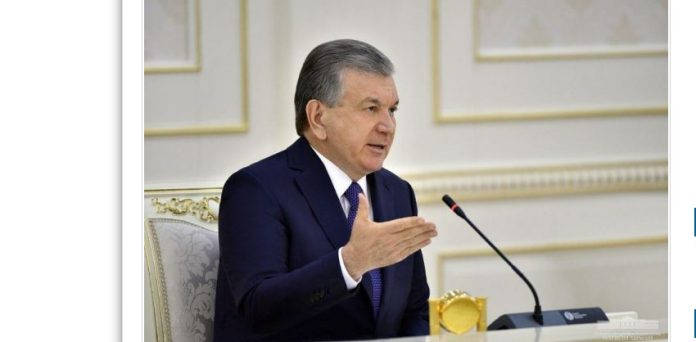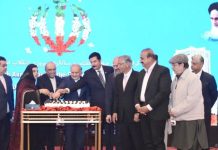On October 8, President of the Republic of Uzbekistan Shavkat Mirziyoyev chaired a videoconference on measures to increase the role of women and youth in society and ensure their employment.Women and youth make up a significant part of the population, and solving their problems is an essential part of social work.
In recent years, Uzbekistan has created a vertical system for implementing state policy on women and youth issues up to the level of mahallas.
To address youth issues in each district, a separate position of deputy hokim with a staff of up to 3 specialists was introduced, in each region – deputy hokim with a staff of 4 specialists, 3 and 11 staff units were allocated to the territorial departments of the Agency for Youth Affairs, respectively.
To address women’s issues at the mahalla level, a separate post of Deputy Chairman of the Mahalla has been introduced, at the district level – Deputy Head of the Department for Mahalla and Family Affairs, which is assigned 2 specialists, at the regional level up to 8 staff units have been allocated.
In addition, People’s Reception Offices of the President and trade unions are assigned to address issues of youth and women, respectively.However, the ability of these agencies and four local sectors to effectively organize the work in this area raises questions.
In this regard, the introduction of a new system for working with women and youth has been determined.As is known, in order to provide social support to the population, Uzbekistan has started maintaining a list of families in need of financial assistance and support, also known as the “iron notebook”. Similarly, a “youth notebook” and a “women’s notebook’ will be formed in each mahalla, district, city and region. These lists will be kept separately from the “iron notebook”.
They will include young people and women in need of social, legal and psychological support, as well as those seeking to acquire new knowledge and professions. As a result, systematic, targeted work will be established with them.System of work with youth and women in the example of Khatirchi district and Yangiyer city was discussed at the meeting.
Responsible persons were instructed to develop a standard model of this system and test it in the Republic of Karakal Pakistan, Tashkent city, one city and district of each region, in 28 territorial units.Heads of sectors and representatives of responsible agencies were instructed to study the situation in each mahalla, talk with each woman and young man, identify their interests and needs, and develop targeted measures on this basis.“From now on, we need to establish a system of employment of the unemployed by visiting people’s homes. The situation will change where managers visit homes and resolve issues. The main goal is to move from the economic stability to efficiency”, said the President.

It was noted that it is important to motivate youth and women to improve their knowledge and skills, acquire a profession, and provide them with psychological, legal, medical and financial assistance.For example, we can arrange free consultations through a family psychologist or district department of justice. Nursing staff, mahalla and family departments can work with single elderly women.Ensuring the employment of unemployed youth and women should be the most important task of Deputy hokim for investments, district and city employment departments, Business Support Center, Prime Minister’s reception offices and banks.Organizing meetings with celebrities who have achieved great success through their work to motivate young people and women, preparing and distributing audio and video materials that teach foreign languages, professions and business will also give a good result.The importance of making extensive use of social contract mechanism was highlighted at the meeting. At the same time, the state provides material and social support for a citizen to acquire a profession, find a job or ensure their own employment.It was noted that while working with “notebooks”, it is necessary to effectively use the capabilities of non-governmental non-profit organizations. The importance of expanding interaction with them in such areas of work as social adaptation of persons who have served their sentences, psychological support for youth and women, teaching them foreign languages and professions was noted.The potential of “Mahalla va Oila” Research Institute, Institute for Studying Youth Problems and Training Promising Personnel will be mobilized for this work. In addition, non-governmental non-profit organizations will be granted loans at 4 percent per annum for the implementation of comprehensive programs of business courses and microfinance services.The issue of providing these measures with stable sources of financial resources was also considered.Special attention was paid to youth and women’s employment issues.Studies have shown that 55% of low-income women have a secondary education. The majority of unemployed young people do not have in-demand skills.“Many social and economic problems will be solved if we systematically prepare young people and women for professions that are in demand on the labor market, and help them find a decent job. It is necessary to attract not only state educational institutions, but also more than a thousand non-state vocational training centers”, stressed Shavkat Mirziyoyev.

It was noted that a completely new system will be introduced for this purpose, and $100 million will be allocated from the Reconstruction and Development Fund for development of professional skills among youth and women through non-state vocational training centers. Of these, $10 million will be allocated for professional training of youth and women, and $90 million will be allocated for soft loans for those who have completed advanced training courses and received a certificate. Under the social contract, young people and women who want to attend training courses at non-state vocational training centers will be able to receive subsidies of up to 1 million UZS to cover training costs.Another important issue is that the Classifier of main positions of employees and professions of workers does not meet the requirements of modern labor market. For example, 2,484 or 70 percent of positions of employees included in the classifier require higher education. In particular, this requirement applies to professions such as database specialists and web designers. These professions can be purchased in IT centers in six months.Many professions, such as librarian, translator, bank agent and advertising specialist also require higher education. There are about 4 thousand vacancies in these professions and positions on the labor market.The Ministry of Employment and Labor Relations has been instructed to reduce the number of classifier positions and professions that require higher education.It was noted that Deputy Hokims for Social Affairs are responsible for the “youth book”, and Deputy Hokims for Mahalla and Family Affairs for “women’s notebook”.Deputy prime ministers, ministers and hokims’ reports were heard at the event.




















